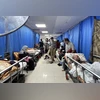Israeli tanks on Friday mounted a new push into southern Gaza's main city, which is sheltering hundreds of thousands of Palestinians driven there by Israeli bombardment, once more approaching the enclave's biggest functioning hospital.
People inside Khan Younis' Nasser Hospital, forced to house displaced Gazans as well as patients, reported hearing shellfire from tanks advancing into the west of the city, while residents also reported fierce gun battles to the south.
The Gaza health ministry said 142 Palestinians had been killed and 278 injured in the previous 24 hours.
Israeli officials have accused Hamas fighters of operating from Nasser Hospital, which staff deny.
The Israeli bombardment and ground invasion launched in response to Hamas' Oct. 7 assault on towns and villages around Gaza have largely emptied the northern two-thirds of the 46 km-long (29-mile) coastal strip.
Around 85% of the 2.3 million population have been driven to seek shelter in the south, according to the U.N. - the area that is now the focus of Israel's campaign to eradicate the Hamas movement that governs Gaza.
More From This Section
People's ability to monitor the latest threats, report attacks or check on relatives - along with the functioning of rescue services - has been severely curtailed by a near-total blackout on telecommunications that was now in its eighth day, the longest outage since the start of the war.
Twelve people were killed in Israeli strikes on a residential building near the largely non-functioning Al-Shifa Hospital in Gaza City in the north of the enclave, Palestinian health officials said.
Israeli forces have made limited withdrawals from northern Gaza this month, saying operations there were largely complete.
But Palestinians in the southern Gaza City suburb of Tel Al-Hawa said Israeli tanks pushed back into the neighbourhood, forcing people taking shelter in some schools there to evacuate and head south.
The Islamic Jihad militant group said it had fought with Israeli forces in the Al-Bureij and Al-Maghazi refugee camps in central Gaza and in Khan Younis, while Hamas's armed wing said its fighters had clashed with Israeli forces in several areas across Gaza overnight and on Friday morning.
The Israeli military said it was continuing operations in central and northern Gaza, seizing weapons and killing "several armed terrorists".
Prime Minister Benjamin Netanyahu said on Thursday that Israeli forces had destroyed "16 or 17" out of 24 of Hamas' organised combat regiments, but that clearing the territory of militants would take "many more months".
NETANYAHU OPPOSED TO PALESTINIAN SOVEREIGNTY
Israel's onslaught on Gaza was triggered on Oct. 7 by Hamas attacks on the surrounding area in which around 1,200 people were killed and 253 taken hostage, of whom around half are still in Gaza, according to Israeli tallies.
Israel's onslaught on Gaza was triggered on Oct. 7 by Hamas attacks on the surrounding area in which around 1,200 people were killed and 253 taken hostage, of whom around half are still in Gaza, according to Israeli tallies.
Netanyahu also restated his opposition to the establishment of an independent Palestinian state that Israel's main ally, the United States, and many powers in and beyond the Middle East advocate as the only feasible long-term solution to the conflict.
"Israel must have security control over the entire territory west of the Jordan River. That's a necessary condition," Netanyahu told a briefing in Tel Aviv. "It clashes with the principle of sovereignty, but what can you do?" U.S. State Department spokesperson Matthew Miller responded at a news briefing that the establishment of a Palestinian state was the only way to provide lasting security to Israel along with reconstruction, governance and security for Gaza.
Washington has had scant success in persuading Israel to alleviate the plight of an increasingly desperate civilian population, deprived since October of most of the regular humanitarian supplies on which they had depended, let alone of adequate medical care for the more than 62,000 people who have been wounded, alongside almost 25,000 dead.
One doctor was forced a month ago to amputate his 18-year-old niece A'Hed's leg below the knee, without anaesthetic, and using little more than a pair of scissors, gauze and sewing thread, after she said her family's home in Gaza City was hit by Israeli tank fire.
The house is only 1.1 miles (1.8 km) from Al-Shifa hospital, usually a six-minute drive or a 25-minute walk away, but Hani Bseiso said intense Israeli fire made it too dangerous to try to get there.
"Could I get her to the hospital? Of course not," Bseiso told Reuters in an interview, describing the area as "under siege".
"The tanks were at the entrance of the house," he said.
"The choice was that I either let the girl die or I try to the best of my abilities."
Asked for comment, the Israeli military did not specifically respond to questions about the incident at A'Hed Bseiso's home, but said Hamas used hospital complexes as cover, an allegation the militant group denies.
More than 1,000 children in Gaza had undergone leg amputations by the end of November, according to the U.N.
children's agency UNICEF, amid poor hygiene and shortages of medicine.

)
